- Home
- Joseph Boyden
Three Day Road
Three Day Road Read online
Awards for Three Day Road
Winner of the Rogers Writers’Trust Fiction Prize
Winner of the CBA Libris Fiction Book of the Year
Winner of the Amazon.ca/Books in Print First Novel Award
Winner of the CAA MOSAID Technologies Inc. Award
for Fiction Silver Medal
Winner of the 2005 McNally Robinson Aboriginal Book of the Year
Shortlisted for the Governor General’s Award for Fiction
A CBC Canada Reads Selection
Praise for Three Day Road
“It’s gripping, wrenching, eye-opening, illuminating, stirring, moral (not moralistic) fiction, rooted in closely observed fact … Boyden, like Homer in The Iliad, is precise and unflinching in his descriptions of the ways in which soldiers fall in battle … This novel is a remarkable achievement, and a breathtaking debut.”
—The Globe and Mail
“The writing is minimalist, the characters vivid, the pace measured, the hold on the reader firm … This book will stir up controversy, win awards, hit bestseller lists, and spawn a feature film. Count on it.”
—The Montreal Gazette
“Three Day Road, his first novel, will stand beside Timothy Findley’s classic The Wars as a moving account of the Great War from a Canadian perspective, but Boyden has delivered something new … The cinematic battle scenes blaze with intensity and the riveting climax of the boys’ friendship feels brutal and inevitable. It satisfies even as it shocks … the writing is glorious and shines with real immediacy … Boyden is a remarkable storyteller. Three Day Road is an unforgettable and valuable depiction of the aboriginal Canadian experience in the First World War and at home.”
—The National Post
“You will never forget these two young Cree snipers plunged in the horror of the First World War, where the enemy was so close that one could smell him. A beautifully written and haunting story of survival and innocence shattered, of friendship, death, redemption and love of the land. The three protagonists, Xavier, Elijah, and Niska will be in my heart forever. Please, please don’t miss it!”
—Isabel Allende
“Three Day Road is as fine a novel as I have seen during the five years I have been reading first novels. My prediction is that it will win every award for which it is nominated, and that it will become a Canadian and international classic.”
—W.P. Kinsella, Books in Canada
“The extraordinary richness of Boyden’s prose and his material, both in the forgotten history he’s recovered and his electric metaphors, make Three Day Road one of the finest novels in an already rich national tradition.”
—Maclean’s
“Joseph Boyden’s Three Day Road is a brilliant novel. You will suffer a bit, but it’s overwhelmingly worth the voyage.”
—Jim Harrison
“Three Day Road is a devastatingly truthful work of fiction, and a masterful account of hell and healing. This is a grave, grand, and passionate book.”
—Louise Erdrich
“Three Day Road is that rarest of books: It works on different levels for different readers. It can be enjoyed as a military history, a study of the tragedy of First Nations people in Canada, or simply as a strong literary novel set against a First World War backdrop. Read it and see for yourself.”
—The Vancouver Sun
“A tale that’s pure magic ... Boyden’s braided stories twine together to a surprisingly gentle ending. There is death—many deaths—but there is also rebirth and beauty in this author’s passionate storytelling as in the world he describes.”
—Straight.com
“Three Day Road [is] a stunning, epic story … has a greatness about it…”
—Winnipeg Free Press
“This poignant tale weaves together magic, hubris, and plain good storytelling, making it one of the best Canadian literature offerings of the season.”
—The Calgary Herald
“Perhaps the most startling success of this book is the way it combines a tale of racial and cultural displacement with a mystic saga … He guides us through immensely complex stories with subtlety and grace.”
—Independent on Sunday
“There have been so many fine novels inspired by the First World War that to read one that is not just harrowing, but fresh, comes as a pleasant surprise … [It’s] a fully rounded work of fiction which, after a quiet opening, develops into a real page-turner … His portrait of an indigenous people who are, in their way, hunted to near-extinction is poignant and convincing.”
—Sunday Telegraph
“Boyden strips away unnecessary embellishments and tells his story with the starkness and simplicity that does justice to the raw worlds of bush and trench. It is an absorbing read, with chilling, exhaustive detail about the butchery of animals and soldiers. But the net effect is rewarding—hallucinatory, even—as the reader is drawn into the Cree network of spirits, voices, and stories.”
—Scotland on Sunday
“It takes an exceptionally intense and clear vision for a writer to persuade us that there is anything new to be said about the Great War, now creeping steadily towards its centenary anniversary. Yet every now and then a book comes along (or, in the case of Pat Barker, a trilogy) that rescues from the mire and carnage a genuinely new perspective on the awful events of 1914–1918. Focusing on the rarely told stories of indigenous people enlisted into the Canadian army, Joseph Boyden’s first novel, Three Day Road, is one such book … What sets Boyden’s writing alongside other notable war novels is the way in which the fighting, for all the grim detail, does not dominate his other, broader themes. He succeeds in driving the narrative along with sufficient dramatic incident to satisfy his brothers, but what haunts the book are the more insidious developments offsetting the conflict in Europe.”
—The Glasgow Herald
“Simply, beautifully, Boyden takes us into the minds and hearts of his characters. The result is an otherworldly reading experience … this is that rare novel that illuminates the past for the present—for all time, in fact.”
—New Orleans Times Picayune
“Three Day Road is a compelling read, beautifully told, and timeless in its lessons.”
—Rick Bass
“There are also lyrical moments which posses an eerie power— especially where Boyden writes about the northern landscape and the human relationship to it. He has illuminated a forgotten corner of the Great War and that, in itself, is a prodigious achievement.”
—The Independent
PENGUIN CANADA
THREE DAY ROAD
A Canadian of Irish, Scottish, and Métis roots, JOSEPH BOYDEN is the author of Born with a Tooth, a collection of short stories that was shortlisted for the Upper Canada Writer’s Craft Award. He divides his time between northern Ontario and Louisiana, where he teaches writing at the University of New Orleans. Three Day Road is his first novel and will be published in ten languages.
ALSO BY JOSEPH BOYDEN
Born with a Tooth
(short stories)
THREE
DAY
ROAD
JOSEPH BOYDEN
PENGUIN CANADA
Published by the Penguin Group
Penguin Group (Canada), 90 Eglinton Avenue East, Suite 700, Toronto, Ontario, Canada M4P 2Y3
(a division of Pearson Canada Inc.)
Penguin Group (USA) Inc., 375 Hudson Street, New York, New York 10014, U.S.A.
Penguin Books Ltd, 80 Strand, London WC2R 0RL, England
Penguin Ireland, 25 St Stephen’s Green, Dublin 2, Ireland
(a division of Penguin Books Ltd)
Penguin Group (Australia), 250 Camberwell Road, Camberwell, Victoria 3124, Australia
(a division of Pearson Austr
alia Group Pty Ltd)
Penguin Books India Pvt Ltd, 11 Community Centre, Panchsheel Park, New Delhi – 110 017, India
Penguin Group (NZ), 67 Apollo Drive, Rosedale, North Shore 0632, New Zealand (a division of Pearson New Zealand Ltd)
Penguin Books (South Africa) (Pty) Ltd, 24 Sturdee Avenue, Rosebank, Johannesburg 2196, South Africa
Penguin Books Ltd, Registered Offices: 80 Strand, London WC2R 0RL, England
First published in a Viking Canada hardcover by Penguin Group (Canada), a division of Pearson Canada Inc., 2005
Simultaneously published by Penguin Group (USA) and Weidenfeld and Nicolson UK.
Published in a Penguin Canada paperback by Penguin Group (Canada), a division of Pearson Canada Inc., 2006
Published in this edition, 2008
(WC) 10 9 8 7 6 5 4 3 2 1
Copyright © Joseph Boyden, 2005
We acknowledge the support of the Canada Council for the Arts which last
year invested $21.7 million in writing and publishing throughout Canada.
Nous remercions de son soutien le Conseil des Arts du Canada, qui a investi
21,7 millions de dollars l’an dernier dans les lettres et l’édition à travers le Canada.
All rights reserved. Without limiting the rights under copyright reserved above, no part of this publication may be reproduced, stored in or introduced into a retrieval system, or transmitted in any form or by any means (electronic, mechanical, photocopying, recording or otherwise), without the prior written permission of both the copyright owner and the above publisher of this book.
Publisher’s note: This book is a work of fiction. Names, characters, places and incidents either are the product of the author’s imagination or are used fictitiously, and any resemblance to actual persons living or dead, events, or locales is entirely coincidental.
Manufactured in the U.S.A.
Library and Archives Canada Cataloguing in Publication data available upon request to the publisher.
ISBN: 978-0-14-305695-6
Except in the United States of America, this book is sold subject to the condition that it shall not, by way of trade or otherwise, be lent, re-sold, hired out, or otherwise circulated without the publisher’s prior consent in any form of binding or cover other than that in which it is published and without a similar condition including this condition being imposed on the subsequent purchaser.
Visit the Penguin Group (Canada) website at www.penguin.ca
Special and corporate bulk purchase rates available; please see
www.penguin.ca/corporatesales or call 1-800-399-6858, ext. 477 or 474
JACOB
kina ntehi
AMANDA
kina ninikamowin
We walk through the snow, follow our trail out to the traplines by the willows. I lead, sleepy. Bitter air. Sharp in the lungs. Elijah walks in my tracks. The sun is coming.
I break through the crust with each step. Too cold last night. Elijah tries to be quiet, but his feet sound heavy.
Elijah and me, we are the same age. We have lived twelve winters.
The trees moan and crack. The sound is like dying.
“Do you think we have snared anything?” Elijah asks.
I stop, look back at him. “Stay quiet.”
Tracks everywhere around us here. Footprints in the snow. Shallow prints. Scoops of shadow in the white.
Up ahead, the dark line of it hangs in the air. My heart beats faster.
“Have we caught something, Xavier?”
A marten has sprung our willow trap. It dangles above the snow as if floating. Up close I see the rawhide noose around its neck. Its fur is thick. Auntie will be proud.
Elijah pushes past me, reaches for the marten, grasps the long body in his mittens. He turns to me and smiles. The marten begins to twist and snarl. Elijah lets go, shocked. We did not realize it is still alive.
We stand back and stare as the marten struggles in the air. The black eyes focus on me. It does not want to die.
“What do we do, Xavier?”
“You must club it.”
Elijah finds a stick and approaches the animal. He looks back at me.
“Do it.”
He hesitates, then swings the stick. The animal screams out. The sound frightens me.
“Harder!”
Elijah swings again, and again the marten squeals. My stomach feels sick. I pick up a heavier piece of wood, step up, and give it a sharp blow to its head. The hide noose snaps and the marten drops to the ground. It doesn’t move. I club its head once more.
Elijah stares at me.
“We had to do it,” I say.
“We had to,” he repeats. “Our first night out alone and we have already taken an animal. Your Auntie will be impressed.”
I nod and smile.
I untie the noose from the marten’s neck, take out my knife and begin to skin it. I make sure to be careful, to not damage the fur, to keep the body intact. I want Auntie to see that I do not waste.
Elijah watches. His eyes miss nothing. He takes off one mitten and bends down to touch the marten’s naked body. “We are great hunters, aren’t we, Xavier?”
“Yes, Elijah,” I say.
“We are great hunters and best friends, yes?”
“Yes,” I say.
EKIIWANIWAHK
Returning
FOR MANY DAYS I’ve hidden in the bush by the town, coming out when I hear the call, watching carefully for him. This is an ugly town, far bigger than Moose Factory, even. This is a town I have not been to before, a place to which I will never return. More wemistikoshiw than I want to see walk the dusty streets in their funny clothes, dressed as if for colder weather, though the sun above us is high and full of summer heat.
I hide well during the day, but when the sound of it reaches my ears I have no choice but to come out and walk among them. They stare and point and talk about me as if they’ve not seen one of me before. I must look a thin and wild old woman to them, an Indian animal straight out of the bush. Soon I will have only enough food left to get us home, and so I’ve taken to setting snares around my camp. The rabbits, though, seem as afraid of this place as I am.
Where it comes to rest is just a wooden platform with a small shelter to hide in when the weather turns. The road that leads up to it is covered in dust. Automobiles, just like the one Old Man Ferguson back in Moose Factory drives, rush there at the same time every other day. I have watched them pour what smells like lantern oil onto the road, but still the dust floats up so that it coats the inside of my nose and bothers my eyes. At least I can hide a little in the dust, and not so many of them can see me.
The place where I go is covered in soot so that I feel the need to bathe each day that I return from there without him. I have stopped sleeping at night, worried that the words were wrong, that he will never come, that I will die here waiting.
Again today I hear the call. Again today I wait for the others to get there before me, before I step among them.
The old ones call it the iron toboggan. As I watch this thing approach, whistle blowing and smoke pouring from the chimney in the summer heat, I see nothing of the toboggan in it. More frightening than the crowd of people around me is the one bright eye shining in the sunlight and the iron nose that sniffs the track.
Too many people. I’ve never been around so many wemistikoshiw at one time. They walk and jostle and talk and shout to one another. I look out at the spruce across the tracks. Blackened by soot, they bend in defeat.
I stand back in the shadow of the shelter and watch as the people in front of me tense, then move closer to the track as it approaches, not further away as I would have expected. The women in the crowd look nothing like me, wear long dresses made of too much material and big hats. They hold bowed cloth shields above their heads. The men are dressed in black and brown and grey suits, and the shoes upon their feet are shiny, so shiny that I wonder what kind of animal the leather has come from. All of the men wear hats,
too. All these people wearing hats in summer. I do not understand much of the wemistikoshiw.
It whistles like a giant eagle screaming, so close now that I must cover my ears.
I have paddled by myself against the big river’s current for many days to get here. No mind. My one living relation died in a faraway place, and I am here to greet his friend Elijah. Elijah Whiskeyjack is as close to a relation as I still have, and I will paddle him home.
Joseph Netmaker brought the letter out to me. Winter had just started to settle itself into the country. Joseph walked on snowshoes from the town. “This is for you, Niska,” he said. “It is from the Canadian boss, their hookimaw.”
As soon as I saw the brown letter, the English words written upon it, I knew what it contained. I sat down beside the fire and stirred at it with a stick while Joseph read, first out loud and in his stumbling English, then for me in our language.
“‘Serial No. 6711. Deeply regret to inform you, Private First Class Xavier Bird, infantry, officially reported died of wounds in the field, November 3, 1918. Director of Records.’”
I waited for more, but that was all. When Joseph left, I was alone.
Many moons later, when the winter ice was leaving and travel was difficult, Joseph came back with another letter. He explained that it was in reference to Elijah, and that Old Man Ferguson had given it to him to give to me since I was the closest thing to a relation that Elijah had.
The letter said that Elijah had been wounded, that he had only one leg now, that he had tried to rescue another soldier, was given a medal for bravery. It said that although weak, he had healed enough to travel and was expected to arrive in the same town from which he and Xavier had left so long ago.
I had Joseph explain to me how the wemistikoshiw calendar worked, what month I was to be there, and I made careful preparations to journey by canoe to that town where Elijah would arrive. I left early in the summer and paddled up the river. It was difficult. I am older now, but I travelled light. Joseph had asked to come along, but I told him no.

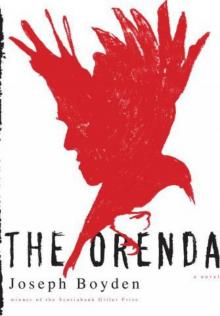 The Orenda
The Orenda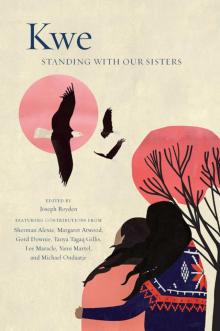 Kwe: Standing With Our Sisters
Kwe: Standing With Our Sisters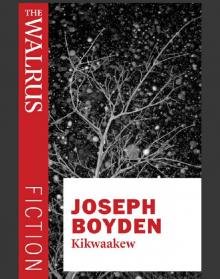 Kikwaakew
Kikwaakew Through Black Spruce
Through Black Spruce Three Day Road
Three Day Road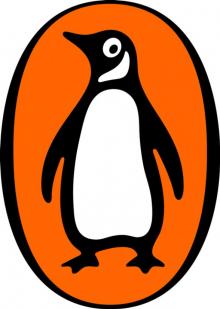 Born With a Tooth
Born With a Tooth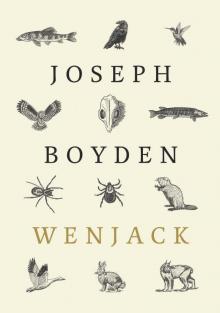 Wenjack
Wenjack Louis Riel and Gabriel Dumont
Louis Riel and Gabriel Dumont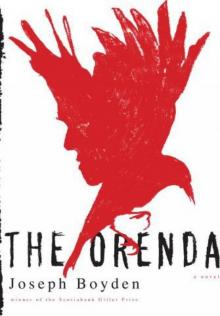 The Orenda Joseph Boyden
The Orenda Joseph Boyden